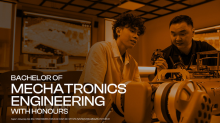Our Bachelor of Mechatronics Engineering programme is designed to provide students with a strong foundation in the core principles and concepts of mechatronics, an interdisciplinary field that integrates mechanical, electrical, and computer engineering.
Throughout this programme, you will explore the design, development, and control of smart systems and devices that combine mechanical, electronic, and software components. The curriculum is carefully crafted to cover a wide range of topics, including robotics, automation, sensors and actuators, embedded systems, and control engineering. You will learn how to design and implement intelligent systems, working with cutting-edge technologies that shape the future of industries such as manufacturing, automotive, healthcare, and aerospace.
One of the key features of our programme is the emphasis on hands-on learning and industry engagement. You will have the opportunity to participate in practical projects, internships, and collaborative research, allowing you to apply your theoretical knowledge to real-world challenges. This approach ensures that you graduate with the technical expertise and problem-solving skills required to excel in the evolving field of mechatronics.
As we welcome applicants from all over the world, we are thrilled to see many students recognising the exceptional quality and opportunities our programme offers, and their drive to be selected in a competitive admissions process.
Duration
Study options
Intake Month
We offer the overseas transfer options of completing your engineering programme at one of our established partner universities.
To support your journey, you can also explore the scholarships offered here.
Note: Fees will be reviewed annually. For the avoidance of doubt, Taylor’s reserves the right to revise the fee payable for any given semester.
Effective 1 July 2025, a 6% Service Tax will be imposed on non-Malaysian citizens, applicable to all fees and charges, except International Security Deposit and EMGS application fees. Fees shown in the Fee Schedule are exclusive of the 6% Service Tax. The Service Tax rate and taxable fee components are subject to change as determined by government regulations.
Our curriculum places a strong emphasis on the practical application of knowledge. Through hands-on laboratory experiments and industry-relevant projects, you will gain valuable experience in applying theoretical concepts to real-world scenarios.
This component consists of Common Core subjects, which are common modules across a discipline that provides the fundamental knowledge of the discipline.
Common Core
Year 1
Year 2
Year 3
Year 4
Note: All information is subject to change. Readers are responsible for verifying information that pertains to them by contacting the university.
Specialisation 1: Robotics
Specialisation 2: Artificial Intelligence (AI)
This component aims to develop critical thinking, build up social intelligence and cultivate civic responsibility as well as broaden cultural knowledge. These consist of compulsory and nationally-mandated study modules required by the Malaysian Ministry of Higher Education.
Notes:
The Flexible Education component offers students the flexibility to explore modules in a related or unrelated field, enhancing and complementing their primary major. This component allows students to broaden their knowledge and skills by selecting modules from the same or different schools within the university.
Flexible Education can take various forms, including free electives, extensions, minors, or even a second major. These options provide students with the opportunity to delve deeper into a specific area of interest or broaden their understanding by exploring a different field of study.
Click here to see a full list of all available Flexible Education Components.
You will need to choose one of the package below.
You will need to select any Minor packages offered by Taylor's University. We have provided some suggested Minors below, and you can refer to the Flexible Education Guide for the complete list.
Choose any Minor package* offered by Taylor’s University.
Refer to the Flexible Study Guide for the list of Minor packages
The minor offered are subject to availability and you will need to meet the minimum module pre and co-requisite.
You will need to select any five (5) of the Free Electives offered by Taylor's University. You can refer to the Flexible Education Guide for the complete list.
The free electives offered are subject to availability and you will need to meet the minimum module pre and co-requisite.
Are you ready to take the next step in your academic journey? Our programme offers an exciting opportunity for individuals passionate about the field of Bachelor of Mechatronics Engineering. To ensure a smooth admission process, please take note of our entry requirements listed below.
SPM/O-Level with Pre-University/Foundation
Pass SPM/O-level or equivalent with 5 credits for entry with Pre-U/Foundation qualification (Except for UEC).
SPM/O-Level with Diploma
Pass SPM/O-level or equivalent with 3 credits for entry with Diploma qualification.
Note: All information is subject to change. Readers are responsible for verifying information that pertains to them by contacting the university.
AUSMAT (SACEi)
ATAR 65 including Mathematics (preferably Specialist Mathematics) and Physics / Chemistry
A Level
Min. DDD including Mathematics and Physics / Chemistry
Canadian Pre-University (CPU)
Min. average of 60% in 6 subjects including Advanced Functions, Calculus & Vectors and Physics / Chemistry
Sijil Tinggi Persekolahan Malaysia (STPM)
CC in Mathematics and Physics /Chemistry
Unified Examination Certificate (UEC)
Pass in UEC with 5Bs with maximum 25 points including Mathematics and
Physics / Chemistry
Taylor’s Foundation in Engineering (FIE)
Pass Foundation in Engineering with min. CGPA 2.00
Foundation in Science (FIS)
Pass Foundation in Science with min CGPA of 2.00 including Mathematics and Physics / Chemistry
International Baccalaureate (IB)
Min. 24 points in 6 subjects including Mathematics and Physics / Chemistry
Monash University Foundation Year (MUFY)
Overall 50% including Physics A&B / Chemistry A&B and Mathematics A&B
Other Qualifications
Ministry of Education Matriculation in related field min. CGPA 2.00 including
OR
Foundation in the Field of Engineering with min. CGPA 2.00
OR
Diploma in Engineering with min. CGPA2.00 from any institution recognised by the Malaysian Govt.
Application via APEL A is allowed. For more information, visit here.
Notes:
LOCAL STUDENTS
IELTS
Band 4.0
TOEFL
30-31 (Internet Based Test)
MUET
Band 3.0
Pre-University/Diploma
Completed Pre-U/Diploma that was conducted in English
INTERNATIONAL STUDENTS
Note: All information is subject to change. Readers are responsible for verifying information that pertains to them by contacting the university.
When you've successfully completed this Bachelor of Mechatronics Engineering programme, you could embark on any of these exciting careers, including:
Embarking on your journey towards a Bachelor of Mechatronics Engineering represents an exhilarating advancement in your educational and professional career. We are here to guide you through the application process, ensuring it is as seamless and straightforward as possible. To discover more about the procedure and the documents required, please visit our Admissions website for further information.
In this section, you get the chance to hear directly from the vibrant voices of our engineering school's communities. As a gathering space for insights and stories, we are excited to showcase the experiences and knowledge of our lecturers, students, alumni, and industry partners.


Engineering Possibilities, It's Your Move | Bachelor of Mechatronics Engineering
Mechatronics isn’t just engineering—it’s the power to create, automate, and revolutionise the world around us.

Engineering Possibilities, It's Your Move | Bachelor of Mechatronics Engineering